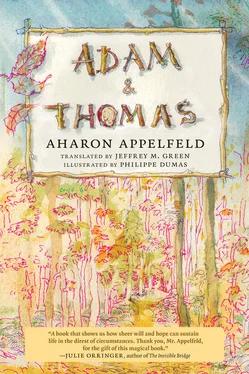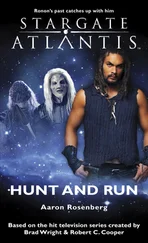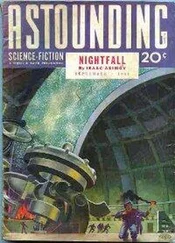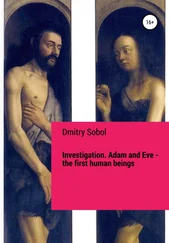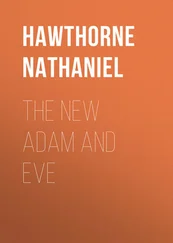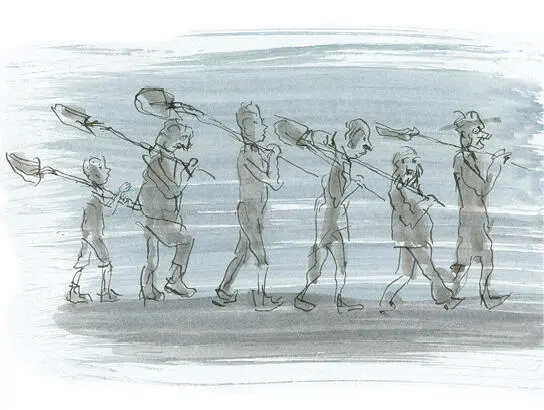
Afterward the nights were quiet, and for a while it seemed there were no more fugitives. The bread and cheese nourished them and Miro. Between one rainstorm and another they would come down from the nest and sneak in to milk the cow.
Adam said, “God only knows how much Mina has been risking for our sake.”
Thomas answered, “I’ve also been thinking about that.”
“Are we worthy of her risk?” asked Adam.
“We’ll do our best to be worthy,” said Thomas with emotion.
“We underestimated her when she was with us in school,” said Adam.
“The conclusion: You mustn’t look down on people. Not on anyone,” said Thomas.
“And you have to repeat the words of Brother Peter, the religion teacher: ‘Every man bears a message in his heart,’” said Adam.
Again at night they heard the stumbling steps of someone fleeing and the running of his pursuers. From the treetop they saw the struggle between the weak and the strong, and their hearts were full of dread.
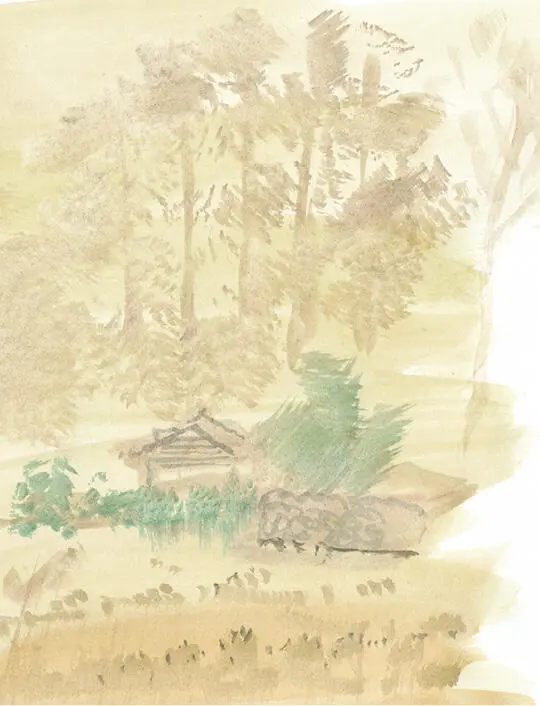
Adam said, “We can’t stand idly by. We have to help the fugitives.”
Thomas didn’t ignore Adam’s words. When he saw a man fleeing, carrying a baby in his arms, he stuck his head out of the nest and called out loudly, “Don’t be afraid, and don’t lose hope. The Red Army is on its way to us. In a little while, a day or two.”
The escaping man didn’t stop to see who was encouraging him but kept on running, out of breath, but the armed pursuers raised their heads. They heard Thomas’s shouts and shot at the nest.
“We have to get out of here,” said Adam.
“Sorry,” said Thomas. “I couldn’t control myself.”
“No matter. A word of encouragement is sometimes like a bandage.”
“Thanks,” said Thomas.
The thought flashed through Adam’s mind: Thomas minds his manners, even when he is tense. In the last darkness, they folded their blankets and the sheepskin coat, closed their backpacks, climbed down from the tree, and blazed a trail into the thick forest. In an hour they saw a tree with a round top. They immediately gathered twigs and branches, Adam climbed up, and Thomas handed him what they had collected. Now they were deep in the forest, far from the paths, and Thomas wondered whether they had gotten too far from the cow and calf and from the tree where Mina placed the food.
Adam said, “I know the forest and everything in it.”
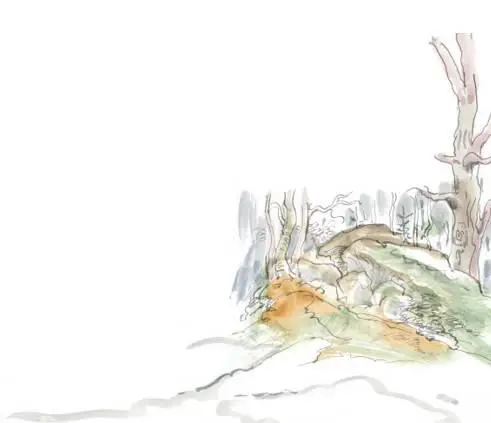
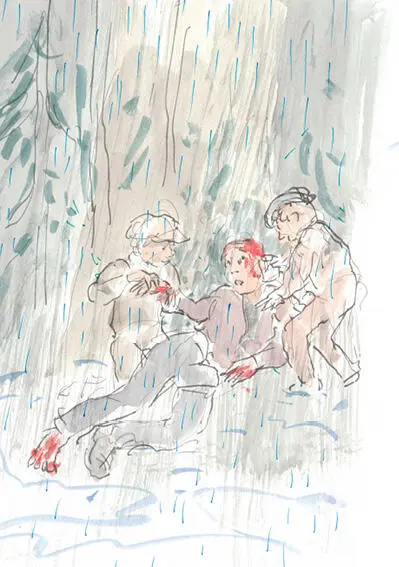
While they were curling up in the new nest, the rain started again. First slowly, then heavily. The sheepskin coat, which had absorbed a lot of rain, was heavy and cold now. If it hadn’t been for Miro, their situation would have been more serious. Miro not only gave off heat, but also happiness.
“I noticed that Miro is different from us but still similar to us,” said Thomas.
“I just love Miro the way he is,” said Adam.
Thomas was surprised once more by Adam’s direct way of thinking. He didn’t complain, didn’t argue, but just acted. There was a lot to be learned from him.
Meanwhile the thunder in the distance got louder. It was hard to know whether it was the thunder of a storm or the booming of cannons. The rain didn’t let up. A fugitive collapsed nearby, and his groaning rose to the treetop. Adam and Thomas took some iodine and bandages, climbed down from the tree, and approached the wounded man.
When he saw the boys, he raised his head and cried out, “Who are you? How did you get here?”
“My name is Adam, and my friend’s name is Thomas. We’ve been hiding out in the forest.”
“I’m wounded, dear children. Thank you for your willingness to help me.”
“If we see the wound, we can bandage it. We have iodine, too,” Adam said softly.
“Good angels. I can’t believe my eyes.”
“We also have a thermos bottle with clean water. We can wash the wound. Then we’ll disinfect it with iodine.”
Without hesitation they rolled up his sleeve and immediately saw the wound. Adam wiped off the blood and washed the wound. Thomas spread iodine on it. The stinging was severe, and the man bit his lips in pain.
They sat around him, together with Miro.
“Who are you?” the man asked again.
Adam stated their names.
“I know your parents, Adam. I own a furniture store, and I buy your father’s handiwork. Your father is a wonderful craftsman.”
“Did you see our mothers, perhaps?” Thomas asked.
“The commotion in the railroad station was huge. It was the last transport. My parents urged me to flee, and I left them to their fate. I’ll never forgive myself.”
“Was that long ago?”
“Quite a few days have already passed. Since then they’ve been running after me. Children, go back to your hiding place. I’ll go look for somewhere to hide. You can already hear the booming of cannons in the distance. The Red Army is approaching. Hold on!”
Still they managed to persuade him to eat some corn pie and drink some water. Finally they left him and went away.
Thomas didn’t stop dreaming. “In my dream I saw Dad coming back from the war. I said to him right away, ‘Dad, forgive me for not reading the books I took with me, and I didn’t solve the arithmetic problems.’ Dad looked at me and said, ‘Don’t be sorry. Right after the war, studies will resume, and we’ll do everything we can to make up for what you missed.’ Strange, I said to myself. Dad is still concerned with my studies, even though he got thin and can barely stand up. ‘I’m sorry,’ I said again. ‘It wasn’t your fault, son.’ He uttered those words and disappeared. A strange dream, right, Adam?”
“I also dream sometimes,” said Adam. “But I forget my dreams.”
“You’re lucky. I dream almost every night. Mom says that the dreams are trying to guide us, to show us what to do. They are our conscience.”
“I don’t know what to say to you,” said Adam. That was a sentence Adam repeated every time Thomas raised a complicated issue. By now Thomas knew Adam’s ways, but he kept asking questions and raising difficulties.
Thomas’s questions sometimes amused Adam. Once Adam said to him, “Next time choose a friend who can answer all your questions.”
As they were making their way to the cow and calf, an old peasant appeared as though he had sprung from the earth, and he alarmed them. The peasant also seemed surprised, and he asked, “Who are you?”
Adam took heart and answered him. “My name is Adam, and my friend’s name is Thomas.”
“Are you Jewish children?” asked the peasant.
“Yes,” said Adam, taking two steps backward.
“And you’re not afraid?”
“A little,” Adam admitted.
“In a little while the Red Army will come, and you can go home. You can already hear the cannons.”
“When will that be?” Adam asked.
“Very soon,” said the peasant, taking a piece of brown cake from his coat pocket and offering it to Adam.
“Thanks, grandfather.”
“You don’t have to thank me, but God. Children, hide well. The Germans are in every corner. Don’t leave your hiding place. I’ll leave a bit of food at the foot of this tree now and then. When the day of victory arrives, come and visit me.”
Читать дальше
